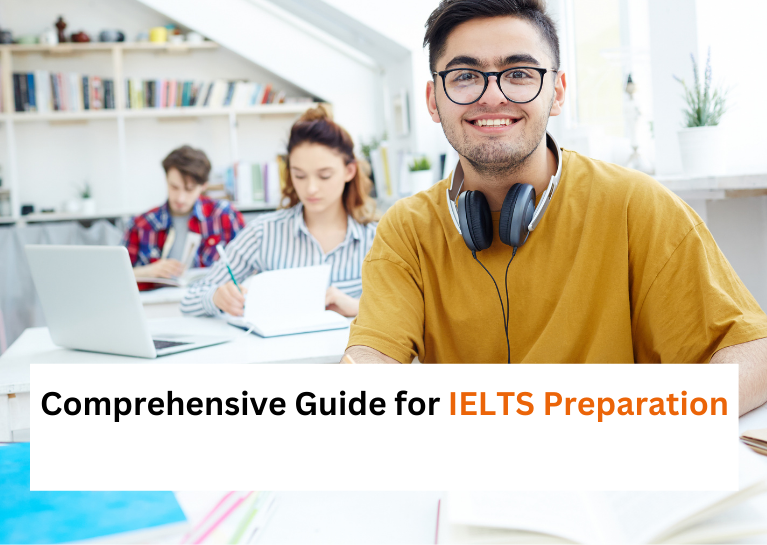Table of Contents
ToggleWhat is IELTS?
The IELTS test checks how good you are at English. It is a big test. It looks at four skills. Listening, reading, writing, and speaking. Big groups made the test. The British Council, IELTS Australia, and Cambridge Assessment English. Many places use IELTS scores. Universities, immigration offices, and professional groups. Over 10,000 places accept IELTS scores around the world.
The IELTS test evaluates your English proficiency in listening, reading, writing, and speaking, making IELTS preparation crucial for success in academic, immigration, and professional settings.
Why is IELTS Important?
Acing your IELTS exam can be a life-changing experience. Here’s why:
- Academic Mobility: Students from other countries need to show they can speak English well to study at top universities in the UK, Australia, Canada, New Zealand, and the USA. The IELTS test score proves their English skills.
- Enhanced Career Prospects: Many employers want people who can speak English fluently. A high IELTS score shows strong English abilities. It can make your resume look better and open doors for jobs worldwide.
- Immigration Requirements: Some countries like Canada, Australia, and New Zealand look at IELTS scores when deciding who can immigrate. A good IELTS result can greatly improve your chances of getting a visa.
Helpful for you: How to Study in the UK Without IELTS?
Understanding the IELTS Exam
Test Format and Sections:
The IELTS exam is offered in two formats: Academic and General Training.
- Academic: The Academic format caters to students. It helps those applying for undergraduate or postgraduate courses. The questions are framed for students seeking higher education.
- General Training: This format is for non-academic purposes. It assists with work experience programs, high school admissions, or immigration applications. The test evaluates English abilities for
Both formats share the same four sections:
- Listening (30 minutes): In this part, you will hear four recordings. You must answer questions about what you heard.
- Reading (60 minutes): You will read three long passages. You will answer different kinds of questions to show how well you understood the passages.
- Writing (60 minutes): This section has two tasks. Task 1 is writing a description. Task 2 is writing an essay with reasons.
- Speaking (11-14 minutes): You will have a conversation with an examiner. The examiner will ask you questions on different topics. You will discuss and answer.
Types of IELTS Exams:
There are two ways to take the IELTS exam:
- Computer-delivered IELTS: In this type, you take the Listening, Reading, Writing, and Speaking tests on a computer. You read, write, listen, and speak using the computer instead of paper.
- Paper-based IELTS: This is the traditional way. You do the Listening, Reading, and Writing tests on paper with a pen or pencil. But for the Speaking test, you still talk face.
IELTS Test Scoring System
The IELTS exam uses a grading system with bands from 1 (beginner) to 9 (expert). Each part is scored separately. You get an overall band score showing your English skills. It’s important to know how each section is graded. This aids in enhancing your IELTS preparation for better performance on the test.
Also Read: What is a CAS Letter UK?
Essential IELTS Preparation Tips:
- Master the Test Format: First, learn how the IELTS test works. Know what tasks you have to do. Know how much time you get for each part. The four parts are Listening, Reading, Writing, and Speaking. If you know the test format well, it will help you practice better.
- Level Up Your Listening Skills: Listen to English content often. Start with easy things like news and podcasts. Then move to harder things like lectures and talks. Practice taking notes as you listen. Write down the main points.
- Become a Reading Powerhouse: Read lots of different English materials. Read academic journals, articles, and non-fiction books. Focus on understanding the main ideas. Look at the evidence that supports the main ideas. Learn new words by seeing how they are used. After reading, summarize what you read to check if you understood it fully.
- Improve Your Writing: Practice writing in English often. Try different tasks like summaries, essays, and letters (like in the test). Focus on grammar, vocabulary, and clear ideas. Consider getting help from a tutor or another test taker.
- Speak English with Confidence: Don’t be afraid to speak English. Find people online or in person to practice conversations on different topics. Or, record yourself speaking about a subject. Then, check your fluency, pronunciation, and vocabulary.
Setting Your IELTS Goals:
- Target Score: Research the minimum IELTS score required by your target university, employer, or immigration program.
- Timeframe: Determine the timeline for taking the test. Allocate sufficient time for effective IELTS preparation.
Best Resources for IELTS Preparation:
Official Resources:
- IELTS Official Website: provides comprehensive information about the test format, registration procedures, and sample test materials.
- British Council: offers various resources including free practice tests, video lessons, and online courses.
Additional Resources:
- IELTS Preparation Books: Many good books focus on different areas of IELTS prep. Some books build vocabulary. Some give grammar practice. Others teach test-taking skills.
- Online Courses and Tutorials: Several websites offer interactive online courses for IELTS prep. These use videos and activities to help you get ready.
- IELTS Coaching Classes: You can join a coaching class. There, experienced teachers give personal guidance. They help by giving feedback.
IELTS Practice Materials:
- Practice Tests: Try out some tests with time limits. This lets you know the exam format, types of questions, and time you have. Getting used to the real test helps a lot.
- Sample Questions: Work on sample questions from good sources often. This shows your strong and weak areas. Then you can focus your IELTS prep on what you need most.
IELTS Speaking and Interview Tips:
- Talk Often: Speak English a lot with people who speak it well. You can join groups to practice talking.
- Learn More Words: Know lots of words for different topics. This will help you explain yourself well during the speaking test.
- Get Ready To Speak: Practice talking about things, experiences, and opinions. This prepares you for questions they might ask.
- Listen Carefully: Get better at listening carefully. Understand the questions fully. Then give good, well-structured answers.
- Be Confident: Act confident and excited during the interview. It’s okay to pause and think before you answer.
IELTS Writing Tips and Sample Essays:
- Task Analysis: Look at what each writing job wants. Task 1 needs things in order and good descriptions. Task 2 is an essay with reasons.
- Grammar and Mechanics: Use correct grammar, punctuation, and sentences.
- Vocabulary Choice: Use different words that fit. Don’t use words too much.
- Practice Writing: Write essays and descriptions often with time limits. This helps you write better and manage time.
- Sample Essays: Read high-scoring sample essays. See how they are put together and use good words.
Strategies for IELTS Listening and Reading Sections:
Listening:
- Develop Active Listening Skills: Work on guessing what will come next based on hints. This helps understand better.
- Skimming and Scanning Techniques: Get better at quickly finding details in listening passages. Practice skimming and scanning.
- Note-taking: Make a way to take short notes. This helps remember main ideas without feeling overwhelmed.
Reading:
- Vocabulary Expansion: Grow your word knowledge. This helps you understand difficult books and writing. New words make reading easier.
- Reading Strategies: Use tricks like quickly looking over text. Or finding key details. Summarize main points. These skills help get important info fast.
- Practice Question Types: Try different reading question formats. Get used to how they’re asked. Familiarity builds skill for the Reading section.
Register for the IELTS Test:
- Select your choice of test mode – computer or paper format.
- Find an exam center located close to your area.
- Sign up online via the official IELTS website or your nearest test center.
Also Read: UK vs Australia for International Students.
Conclusion
To do well on the IELTS exam, you need to work hard, prepare smartly, and stay positive. This guide gives tips and resources to help you build the skills and confidence needed to get the score you want. With frequent practice, a mindset for improvement, and focus on your weak areas, you can succeed on the IELTS. Keep going with your IELTS preparation journey. You can achieve your goal of studying, working, or living in an English-speaking place.






